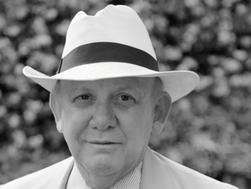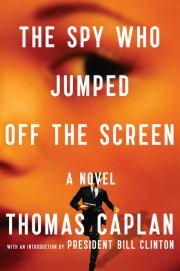 Thomas Caplan is the author of the new thriller The Spy Who Jumped off the Screen (Viking), which features an introduction by Bill Clinton. Born and raised in Baltimore, Caplan is the author of three previous novels and has worked both as an executive in his family's jewelry firm and as a political speechwriter. He lives on the Eastern Shore of Maryland, but travels frequently to Europe, especially England.
Thomas Caplan is the author of the new thriller The Spy Who Jumped off the Screen (Viking), which features an introduction by Bill Clinton. Born and raised in Baltimore, Caplan is the author of three previous novels and has worked both as an executive in his family's jewelry firm and as a political speechwriter. He lives on the Eastern Shore of Maryland, but travels frequently to Europe, especially England.
On your nightstand now:
I am savoring Chad Harbach's The Art of Fielding, a beautifully composed, subtly insightful novel. Directly beneath it is The Hare with Amber Eyes by Edmund de Waal. I am late getting to this, which has been recommended by many friends whose taste I respect. Then there are Douglas Waller's biography of Wild Bill Donovan, the father of the Office of Strategic Services, the forerunner of the C.I.A., and Lauren Hillenbrand's Unbroken, the story of a resourceful and resilient American bombardier's survival after his plane crashed in the Pacific theater of World War II. Finally, I have an old paperback of Eric Ambler's A Coffin for Dimitrios. I remember this as one of the greatest of all thrillers and it seems high time to read it again. Like my father, I have long been an avid fan of the genre and, over the years, have devoured many brilliant, pulse-racing ones from which, incidentally, I've learned a great deal--both about human nature and how the world works.
Favorite book when you were a child:
Peter Pan, closely followed by David Copperfield.
Your top five authors:
This is an impossible question and, of course, must be prefaced by the phrase "other than William Shakespeare." Five writers I admire and whose works continually play in my mind are: F. Scott Fitzgerald, for the deceptively simple poetry of his prose, his faith in romance and understanding of aspiration, especially in an American context; Evelyn Waugh, not only for the brilliance of his satire but the grandeur of his themes; Rudyard Kipling, for sheer adventure and the utter satisfaction of wanderlust; Tennessee Williams, for his unparalleled ability to entwine the carnal and spiritual nature of human life, often in a single sentence; and T.S. Eliot, for the literally haunting precision of his imagery.
Book you've faked reading:
The Return of the Native by Thomas Hardy. It was when I was at school. I don't know why I didn't read it, really. I would have been 16, so perhaps I had a girl on my mind. I did read it much later and greatly admired it. Deservedly, I remember, I received a 10 (out of a possible 100) on the quiz.
 Book you're an evangelist for:
Book you're an evangelist for:
The Hero with a Thousand Faces by Joseph Campbell.
Book you've bought for the cover:
Jaws by Peter Benchley.
Book that changed your life:
Waugh's Brideshead Revisited, which reawakened, in young adulthood, a love of England with which I seem to have been born.
Favorite line from a book:
"Gatsby believed in the green light, the orgiastic future that year by year recedes before us...." --The Great Gatsby by F. Scott Fitzgerald.
Book you most want to read again for the first time:
Hamlet, which is a play, of course, but one I first came to as a reader in school. It compresses more wisdom into exquisite poetry and captivating drama than any other work I know. With the King James Version of the Bible and The Book of Common Prayer, Shakespeare's canon forms the foundation of the English language.

